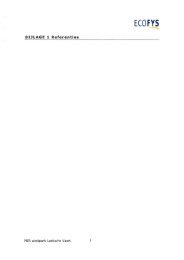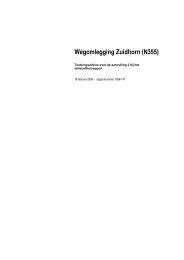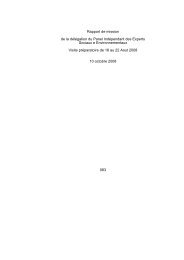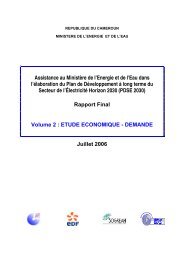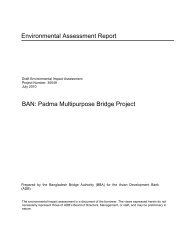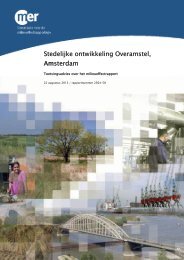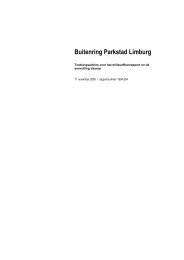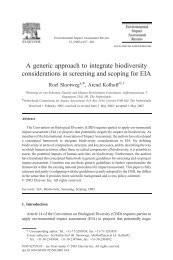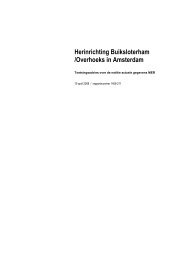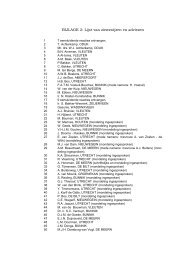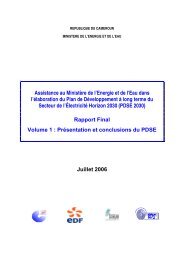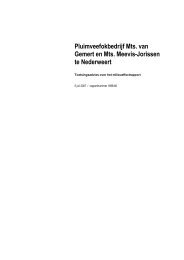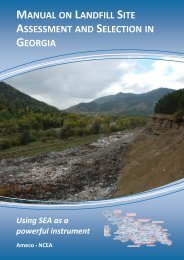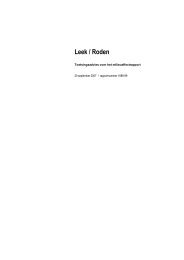Scoping Advice for the Dutch IWRM Support Programme Rwanda
Scoping Advice for the Dutch IWRM Support Programme Rwanda
Scoping Advice for the Dutch IWRM Support Programme Rwanda
Create successful ePaper yourself
Turn your PDF publications into a flip-book with our unique Google optimized e-Paper software.
. Assess <strong>the</strong> way in which <strong>the</strong>se services are represented by <strong>the</strong> Master Plan; can all relevantecosystem services be recognised in <strong>the</strong> Master Plan;c. Assess whe<strong>the</strong>r proposed measures will have an impact on ecosystem services. Are <strong>the</strong>seimpacts accounted <strong>for</strong> in <strong>the</strong> Master Plan? (For example: irrigation development can beconsidered in terms of amount of water needed, but large scale (wet)land conversion mayhave serious consequences <strong>for</strong> river hydrology.);d. Water quality represents an important aspect of <strong>the</strong> availability of water resources. Assesswhe<strong>the</strong>r interactions between water quality and quantity have been addressedappropriately by <strong>the</strong> Master Plan;e. Provide suggestions <strong>for</strong> aspects that need to be taken into account and <strong>for</strong> whichadditional in<strong>for</strong>mation needs to be collected; and provide advice on how to deal withpotential gaps in water resources monitoring and fur<strong>the</strong>r water management planning.4. Alternative development options and scenariosThe Master Plan will suggest measures necessary to maintain equilibrium between water supplyand demand. The inception report states that <strong>the</strong> options are overwhelming and should beconsidered on <strong>the</strong> basis of <strong>the</strong>ir economic, social and environmental merits. It is not completelyclear whe<strong>the</strong>r <strong>the</strong> plan will consider various alternative options or that it will provide one bestoption. It is important that various alternative options will be presented <strong>for</strong> decision makers toconsider <strong>the</strong>ir respective consequences. Supposedly various scenarios are used, with timehorizons at 2020, 2030 and 2040.SEA task 4:a. Check whe<strong>the</strong>r various alternative options or scenarios are provided by <strong>the</strong> Master Plan;b. Describe <strong>the</strong> proposed water management measures and identify potential alternativemeasures when not provided by <strong>the</strong> plan;c. Assess <strong>the</strong> proposed measures to manage water supply and demand on <strong>the</strong>ir potentialsocial and environmental consequences in qualitative terms. Assessment criteria includepoverty, access to water and water related services (including gender differentiation),maintenance of water related ecosystem services;d. Provide a semi-quantified overview of potential impacts by comparing <strong>the</strong> alternativesand/or <strong>the</strong> different scenarios. If possible differentiate <strong>for</strong> different time horizons.5. Transboundary effectsWith respect to transboundary issues <strong>the</strong> Master Plan team will study, when available, existingconventions on <strong>the</strong> use of shared water resources and, where no conventions are available, willtake account of established international principles <strong>for</strong> <strong>the</strong> management of shared waterresources.SEA task 5:a. Assess whe<strong>the</strong>r proposed water management measures have a “no regret” character froman international river basin perspective. This relates to water quantity as well as waterquality, and also requires verifying whe<strong>the</strong>r measures correspond with bindinginternational agreements and commitments.36



